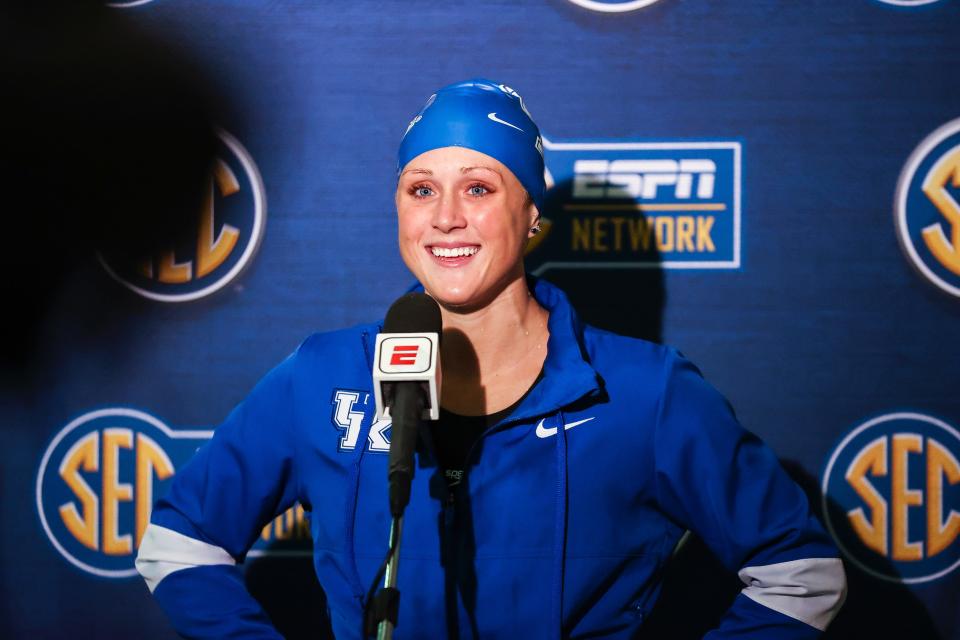Free speech under attack: 'Triggered' students mob athlete who spoke about women's sports
Riley Gaines is used to making waves. Yet the former NCAA collegiate swimmer created more of a storm than she expected when speaking this month at San Francisco State University.
Gaines has become an outspoken proponent of protecting the integrity of women’s sports, and she has relevant personal experience to share on a topic of national debate. At the 2022 NCAA swim championships, Gaines gained notoriety when she tied in the 200-meter freestyle with transgender swimmer Lia Thomas. Thomas had earlier won a national title in a different event.
A mob of SFSU transgender rights activists couldn’t handle the fact Gaines was invited to speak. While she was able to deliver her remarks (with disruptions), a crowd of students pounced on her when she tried to leave the event. In saying she was assaulted, Gaines tweeted: "I was extorted and held for (ransom). The protestors demanded I pay them if I wanted to make it home safely. I missed my flight home because I was barricaded in a classroom."

“In those hours where I was stuck in the room, I could hear the protesters standing outside,” Gaines, a spokeswoman for Independent Women's Forum, told me. “They were screaming, they were chanting, they were yelling vulgar and profane and violent and vengeful things and continually threatened both myself and the (campus police) officers. I was held against my will.
“It was a really terrifying experience.”
Can anything still unite us?: Americans increasingly don't value God, country or children
'Truly chilling' this is happening
Scary stuff.
It’s disturbing to watch the videos of what happened to this young woman, and it was certainly frightening for her.
Riley Gaines has been escorted out of the event into a side hallway in the HSS Building. Students were following through “trans women are women” 8:31 p.m pic.twitter.com/rGaTvrje17
— Golden Gate Xpress (@GGXnews) April 7, 2023
To make it worse, the university’s response was not to apologize to Gaines, but rather to thank the “students who participated peacefully.”
“It’s truly chilling to think that this is the way that universities and administrations and institutions are going,” Gaines says.
This alarming incident is sadly just one of a growing number of examples of intolerance on college campuses. Efforts to silence or intimidate those with whom we disagree are not free speech – they're censorship.
Opinion alerts: Get columns from your favorite columnists + expert analysis on top issues, delivered straight to your device through the USA TODAY app. Don't have the app? Download it for free from your app store.
Last month, a conservative federal appeals judge was shouted down by disgruntled students at Stanford Law School and not given a chance to deliver his remarks.
Is it any wonder students feel they have the right to behave so badly when universities try to “protect” them from views they may find even the slightest bit upsetting?
In a show of how absurd things are getting, common words are now off-limits on some campuses, from Stanford to Michigan State University.
Placing limits on free speech: Stanford's political correctness czars deem 'American' and 'guys' harmful words (no joke)
Luckily, all isn’t lost.
Hope for free speech exists
Some university administrators are standing up to the madness and preserving what the college experience should be about: wrestling with ideas – even uncomfortable ones.
For instance, Martha Pollack, the president of Cornell University, recently vetoed a student resolution that would have called for instructors to include trigger warnings on class readings.
“Learning to engage with difficult and challenging ideas is a core part of a university education: essential to our students’ intellectual growth, and to their future ability to lead and thrive in a diverse society,” Pollack wrote in a letter, along with the university provost.
And this month, Penn State University President Neeli Bendapudi released a short video upholding the First Amendment and defending why the university should allow speakers with controversial views – including hateful ones that could offend students and faculty.
“For centuries, higher education has fought against censorship and for the principle that the best way to combat speech is with more speech,” Bendapudi said. “To combat bad ideas is with better ideas.”

Gaines, who last year was still a college student, understands this. And while it was discouraging to be treated in such a hateful manner, she won't be silenced.
“Where is the open dialogue?” Gaines asks. “That's how we can unite and move forward. Because the way that I was met with this opposition, it's not beneficial to anyone. It's not beneficial to myself. It's not beneficial to the people who are fighting against me or what they're fighting for.”
More young people – and college administrators – should heed that advice.
Ingrid Jacques is a columnist at USA TODAY. Contact her at [email protected] or on Twitter: @Ingrid_Jacques
You can read diverse opinions from our Board of Contributors and other writers on the Opinion front page, on Twitter @usatodayopinion and in our daily Opinion newsletter. To respond to a column, submit a comment to [email protected].
This article originally appeared on USA TODAY: Riley Gaines SFSU reaction asks: How far will 'triggered' students go?
